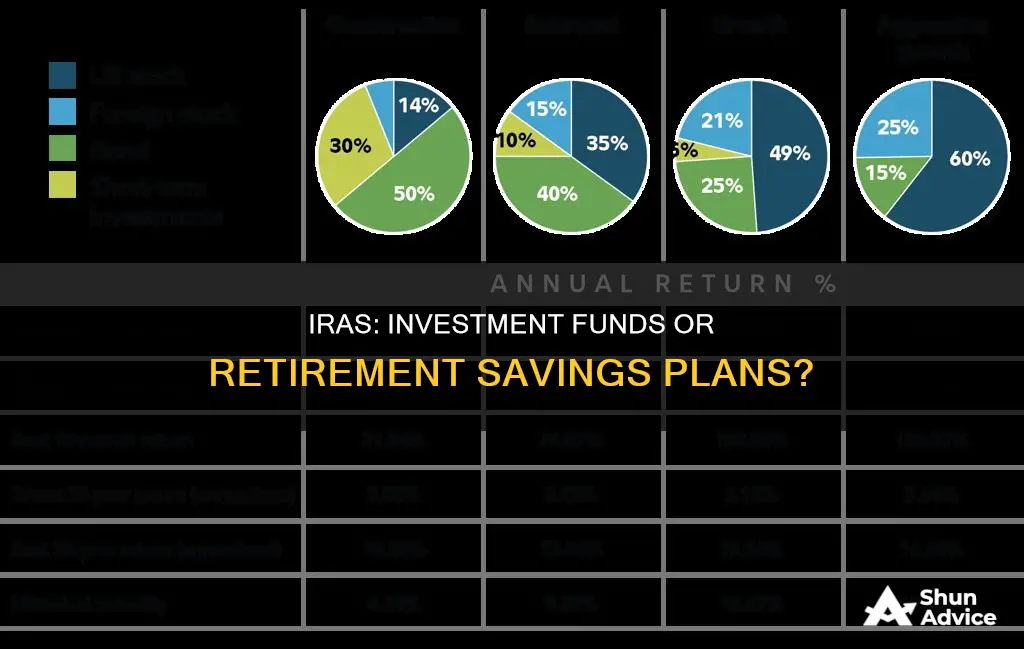
An Individual Retirement Account (IRA) is a long-term, tax-advantaged savings account that allows individuals with earned income to save for retirement. IRAs are one of the most effective ways to save and invest for the future. They allow your money to grow on a tax-deferred or tax-free basis, depending on the type of account. IRAs are designed primarily for self-employed people who do not have access to workplace retirement accounts. However, anyone with earned income can open and contribute to an IRA, and you can also have an IRA even if you already have a workplace retirement plan.
| Characteristics | Values |
|---|---|
| Type of account | Individual retirement account (IRA) |
| Purpose | Retirement savings |
| Tax advantages | Tax-deductible contributions, tax-free withdrawals, tax-deferred growth |
| Investment options | Stocks, bonds, exchange-traded funds (ETFs), real estate, commodities |
| Contribution limits | $7,000 annually for under 50s; $8,000 for 50s and over |
| Withdrawal rules | 10% penalty for early withdrawals (before age 59½) unless an exception applies |
| Account providers | Banks, investment companies, online brokerages, personal brokers |
| Account setup | Anyone with earned income can open an IRA |
What You'll Learn
- IRAs are a long-term, tax-advantaged savings account
- There are several types of IRAs, including traditional IRAs, Roth IRAs, SEP IRAs, and SIMPLE IRAs
- Anyone with earned income can open an IRA, including those with a 401(k)
- IRAs can be opened through a bank, investment company, online brokerage, or personal broker
- Money in an IRA is usually invested in stocks, bonds, ETFs, or mutual funds

IRAs are a long-term, tax-advantaged savings account
An individual retirement account (IRA) is a long-term, tax-advantaged savings account. IRAs are designed to help individuals save for the future in a tax-efficient manner. They are particularly useful for self-employed people who do not have access to workplace retirement accounts, although anyone with earned income can open and contribute to an IRA.
IRAs can be opened through a bank, an investment company, an online brokerage, or a personal broker. There are several types of IRAs, including traditional IRAs, Roth IRAs, Simplified Employee Pension (SEP) IRAs, and Savings Incentive Match Plan for Employees (SIMPLE) IRAs. Each type has different rules regarding eligibility, taxation, and withdrawals.
Traditional IRAs are tax-advantaged personal savings plans where contributions may be tax-deductible. Earnings can grow tax-deferred until withdrawal in retirement, potentially resulting in a lower tax rate. Roth IRAs, on the other hand, are funded with after-tax money, so there are no further taxes due upon withdrawal.
IRAs offer individuals a wide range of investment choices, including stocks, bonds, exchange-traded funds (ETFs), and mutual funds. The best IRA accounts offer the ability to invest in a diverse range of financial products. This provides individuals with more investment options and control over their retirement savings.
While IRAs offer tax advantages, there are also rules and restrictions to consider. There are annual income limitations on contributions, and early withdrawals before the age of 59½ typically incur a hefty tax penalty. However, there are exceptions to the penalty rule for certain situations, such as educational expenses and first-time home purchases.
Overall, IRAs are a powerful tool for long-term savings and investment, providing individuals with a tax-efficient way to build their retirement nest egg.
UK Hedge Fund Investment: Getting Started and Strategies
You may want to see also

There are several types of IRAs, including traditional IRAs, Roth IRAs, SEP IRAs, and SIMPLE IRAs
An individual retirement account (IRA) is a long-term, tax-advantaged savings account that individuals with earned income can use to save for the future. IRAs are designed primarily for self-employed people who do not have access to workplace retirement accounts. However, anyone with earned income can open and contribute to an IRA, even if they already have a workplace retirement plan.
There are several types of IRAs, each with different rules regarding eligibility, taxation, and withdrawals. These include:
Traditional IRAs
Traditional IRAs are tax-deferred retirement savings accounts. Contributions may be tax-deductible, and any earnings can potentially grow tax-deferred until you withdraw them in retirement. Many retirees find themselves in a lower tax bracket post-retirement, so the tax-deferral may result in their money being taxed at a lower rate.
Roth IRAs
Roth IRAs are tax-free retirement savings accounts. Contributions are made with money that has already been taxed, and withdrawals in retirement are also tax-free, provided certain conditions are met.
SEP IRAs
Simplified Employee Pension (SEP) IRAs are set up by business owners or self-employed individuals for themselves and their employees. Similar to traditional IRAs, contributions are tax-deductible, and investments grow tax-deferred until retirement, at which point distributions are taxed as income.
SIMPLE IRAs
Savings Incentive Match Plan for Employees (SIMPLE) IRAs are for small businesses with fewer than 100 employees. Similar to traditional and SEP IRAs, contributions are tax-deductible, and investments grow tax-deferred until retirement. Employees can make contributions to their SIMPLE IRAs, and employers are required to make contributions as well.
Index Fund Investing: Financial Independence Strategy
You may want to see also

Anyone with earned income can open an IRA, including those with a 401(k)
An Individual Retirement Account (IRA) is a long-term, tax-advantaged savings account that individuals with earned income can use to save for the future. IRAs are designed primarily for self-employed people who do not have access to workplace retirement accounts such as the 401(k). However, anyone with earned income can open an IRA, including those with a 401(k).
IRAs are retirement savings accounts that offer tax advantages and work similarly to a 401(k). They are meant to be used to invest and maximize the growth of funds for retirement savings. There are several types of IRAs, including traditional IRAs, Roth IRAs, Simplified Employee Pension (SEP) IRAs, and Savings Incentive Match Plan for Employees (SIMPLE) IRAs.
IRAs can be opened through a bank, an investment company, an online brokerage, or a personal broker. The best IRA accounts offer the ability to invest in a wide range of financial products, including stocks, bonds, exchange-traded funds (ETFs), and mutual funds.
It is important to note that there are annual income limitations on deducting contributions to traditional IRAs and contributing to Roth IRAs. Additionally, money held in an IRA usually cannot be withdrawn before the age of 59 and a half without incurring a hefty tax penalty.
Having a 401(k) account at work does not affect your eligibility to make IRA contributions. However, if you have a 401(k) and a traditional IRA, your tax deduction for the traditional IRA may be limited or not allowed, depending on your modified adjusted gross income (MAGI).
In summary, anyone with earned income can open an IRA, including those with a 401(k). IRAs offer a tax-advantaged way to save for retirement and can provide access to a wider range of investment choices compared to a 401(k). However, it is important to consider the income limitations and potential tax implications when deciding whether to open an IRA.
Mutual Funds in India: Best Time to Invest
You may want to see also

IRAs can be opened through a bank, investment company, online brokerage, or personal broker
An Individual Retirement Account (IRA) is a powerful tool for building a nest egg for the future. It is a type of tax-advantaged account that allows individuals to direct pre-tax or after-tax dollars toward investments that can grow over time. While an IRA itself is not an investment fund, it serves as a vehicle to hold a variety of investments, including stocks, bonds, mutual funds, and exchange-traded funds (ETFs). The flexibility of an IRA allows individuals to tailor their investment strategies according to their financial goals, risk tolerance, and time horizon.
When opening an IRA, individuals have several options regarding where to establish the account. One common choice is to open an IRA through a bank, especially if an individual already has a strong relationship with a particular financial institution. Banks typically offer a range of IRA products, such as savings accounts, certificates of deposit (CDs), and money market accounts. These options are generally considered low-risk and provide a stable foundation for retirement savings, although they may offer lower potential returns compared to other investment options.
Investment companies, often referred to as brokerage firms, also provide the ability to open an IRA. This avenue is particularly attractive to those seeking a wider range of investment choices. Brokerage firms typically offer access to various investment products, including stocks, bonds, mutual funds, and ETFs. They often provide research tools, educational resources, and advisory services to help individuals make informed investment decisions. By opening an IRA with an investment company, individuals can benefit from the expertise and resources provided while maintaining control over their investment choices.
In recent years, the rise of online brokerage platforms has provided yet another option for opening an IRAs. These platforms offer convenience and ease of access, allowing individuals to open and manage their IRAs entirely online. Similar to traditional brokerage firms, online brokerages provide access to a diverse array of investment products. Many of these platforms also offer robo-advisory services, which provide automated investment management based on an individual's financial goals and risk tolerance. This digital approach to IRA management appeals to those who prefer a more hands-off investment experience while still retaining control over their investment choices.
A Beginner's Guide to Investing in Vanguard Funds
You may want to see also

Money in an IRA is usually invested in stocks, bonds, ETFs, or mutual funds
An Individual Retirement Account (IRA) is a long-term, tax-advantaged savings account that individuals with earned income can use to save for the future. IRAs are flexible, and money deposited in an IRA can be invested in a wide range of assets, including stocks, bonds, mutual funds, and exchange-traded funds (ETFs).
Stocks refer to the practice of purchasing a small portion of a company, making the investor a shareholder. This is a riskier investment, as the value of the stock may decrease, but it also has the potential for high rewards.
Bonds are a form of corporate debt. When an investor purchases a bond, they are loaning money to a corporation, which will pay them back with interest.
Mutual funds are a type of investment fund that pools money from multiple investors and uses it to invest in a diversified portfolio of stocks, bonds, or other securities. Mutual funds are managed by professional portfolio managers or investment teams who make investment decisions on behalf of the investors.
ETFs are investment vehicles that combine the features of both stocks and mutual funds. They are traded on stock exchanges, and they are designed to track the performance of specific market indices, sectors, or asset classes. ETFs hold a diversified basket of assets that closely mirror the composition of the index they are tracking, allowing investors to own one type of fund with a diversified portfolio of underlying investments.
Money in an IRA is usually invested in one or a combination of these options, depending on the investor's preferences, risk tolerance, and financial goals.
International Fund Investment: Strategies for Global Portfolio Success
You may want to see also
Frequently asked questions
IRA stands for Individual Retirement Arrangement, as named by the IRS. However, it is commonly referred to as an Individual Retirement Account.
You can open an IRA through a bank, an investment company, an online brokerage, or a personal broker.
The main types of IRAs are Traditional IRAs, Roth IRAs, Simplified Employee Pension (SEP) IRAs, and Savings Incentive Match Plan for Employees (SIMPLE) IRAs.
IRAs offer a tax-advantaged way to save for retirement. Depending on the type of IRA, it can reduce your tax bill when you make contributions or when you take withdrawals. IRAs also offer a wider range of investment options compared to employer-sponsored plans.
Many brokers and robo-advisors do not require a minimum amount to open an IRA. The maximum contribution allowed by the IRS for 2024 is $7,000, with an additional $1,000 allowed for individuals aged 50 or older.







